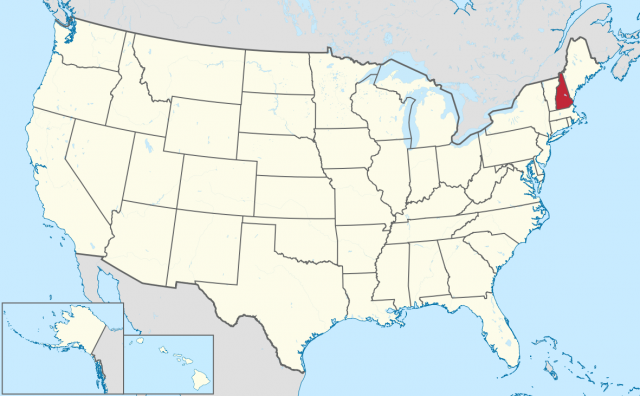The State of New Hampshire
AT A GLANCE
Name: New Hampshire was named for the English county of Hampshire.
Nickname: Granite State
Capital: Concord
Size: 9,283 sq. mi. (24,044 sq km)
Population: 1,330,608 (2015 est)
Statehood: New Hampshire became the ninth state on June 21, 1788.
Electoral votes: 4 (2016)
U.S. representatives: 2 (until 2016)
State tree: white birch
State flower: purple lilac
State reptile: red spotted newt
Highest point: Mount Washington, 6,288 ft. (1,917 m)

THE PLACE
New Hampshire is one of the six New England states. Its 13-mile coastline on the Atlantic Ocean is the shortest coastline of any state bordering an ocean. The land along the coast is flat, and its rivers and streams attract large numbers of migrating ducks and geese.
Most of southern New Hampshire is covered by a series of fertile valleys, beautiful lakes, and forested hills—about 85 percent of the entire state's land is forested. The Connecticut River stretches along the western border of New Hampshire, where there is rich farmland.
New Hampshire's weather is cool year-round. Summers are fairly dry, but winters are snowy, especially in the north and west.
The pleasant summer weather and snowy winters attract many visitors to the White Mountains, which are located in northern New Hampshire. The Presidential Range of the White Mountains has the highest peaks in New England.
Large amounts of granite give New Hampshire its nickname, the Granite State. New Hampshire's natural resources include a variety of minerals, but only sand and gravel are mined to any extent.
Facts and Firsts
- In 1719, the United States's first potato was planted at Londonderry Common Field.
- New Hampshire was the first of the 13 original colonies to declare independence from England.
- The first women's labor strike in the United States took place at the Dover Cotton Factory on December 30, 1828.
- In 1833, Peterborough established the first free public library in the United States.
- In 1905, New Hampshire became the first and only state to host end-of-war negotiations for foreign countries. In that year, the treaty ending the Russo-Japanese War was signed in Portsmouth.
THE PAST
New Hampshire was first explored and settled by the English in the 1600s. Colonists found about 5,000 Native Americans, mostly Algonquian groups, living there. These Native Americans allied with French colonists from Canada to fight against the British during the French and Indian War.
Before the first battles of the Revolutionary War were fought (in Massachusetts), the first armed attack against the British took place in New Hampshire. New Hampshire was the first colony to write a state constitution. This constitution went into effect in 1776, shortly before the Declaration of Independence
was signed.
Colonial New Hampshire was primarily a rural agricultural society, and remained agricultural through the Revolutionary War. In the 1860s, during the Civil War, industry increased in the state, as shipyards and mills began to expand. The textile, woodworking, and leather industries also grew. Ship and submarine manufacturing gave the economy a boost during World Wars I and II. By the end of the 20th century, many rural parts of New Hampshire had become urban and industrialized.
THE PRESENT
Today, only about 7 percent of New Hampshire's land is farmland. Many of the state's approximately 2,900 farms produce dairy products.
New Hampshire maintains a system of low taxation and has no income or sales tax, so many businesses and residents have been attracted to the state.
New Hampshire's manufacturing industries have become vital to its economy. The state produces many different kinds of machinery—especially computer parts.
It also produces electrical equipment such as military communications systems, scientific instruments such as navigational equipment, and medical instruments.
Tourism has also become an important source of income. New Hampshire's mountains, beaches, and lakes attract many vacationers, and its colorful foliage brings thousands of visitors to the state every fall. Tourists visit many popular ski resorts during the winter months.
Revenue from tourism has helped New Hampshire finance many public service projects that are not supported by taxes, such as road construction and schools.
Born in New Hampshire
- Salmon P. Chase, jurist
- Charles Anderson Dana, editor
- Mary Baker Eddy, founder of the Christian Science Church
- Daniel Chester French, sculptor
- Horace Greeley, journalist and politician
- Sarah J. Hale, author, editor, and feminist
- John Irving, author
- Franklin Pierce, U.S. president
- Alan Shepard, astronaut
- Harlan F. Stone, jurist
- Daniel Webster, statesman